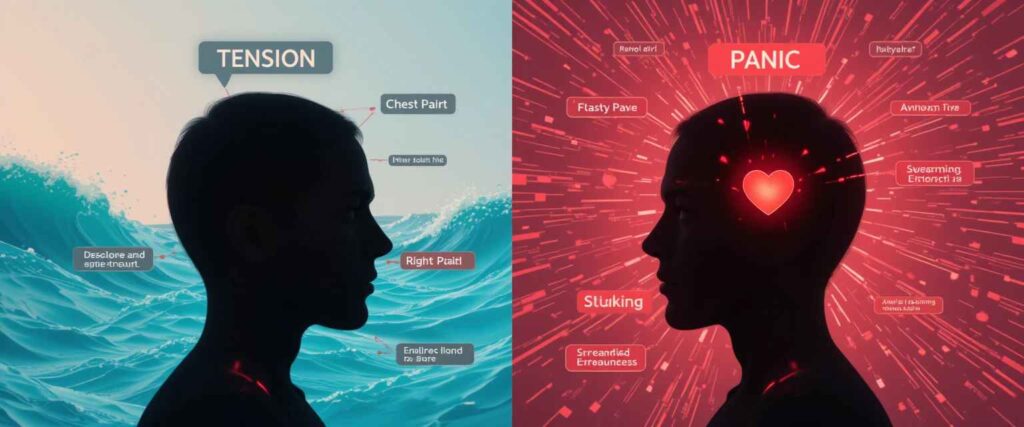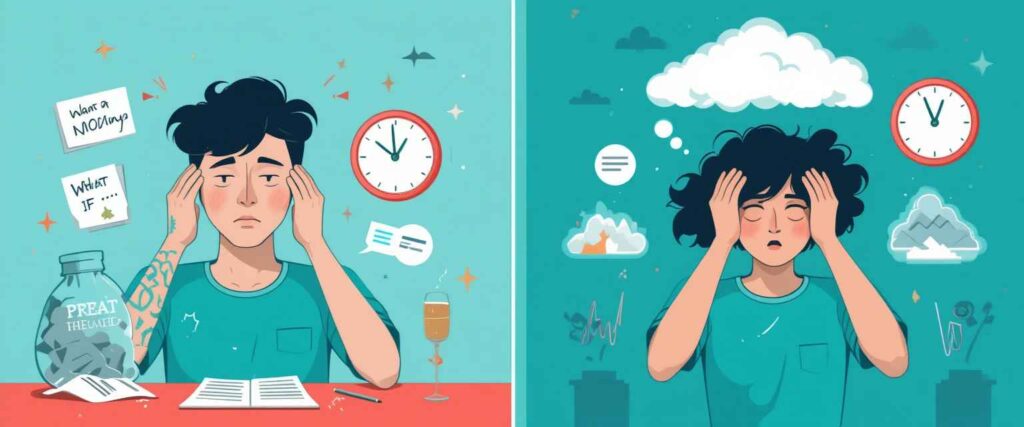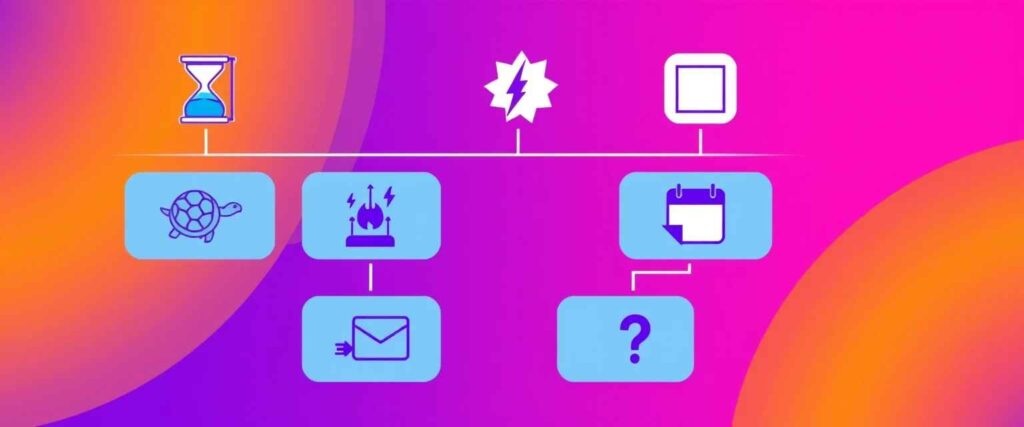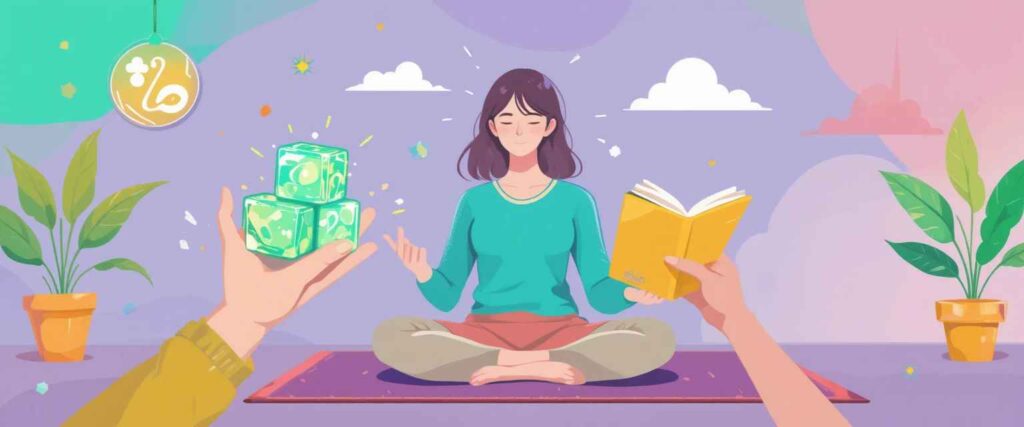Let’s talk about something we’ve all felt but rarely name: that moment when your heart races, your palms sweat, and your brain screams, “Is this anxiety… or am I having a panic attack?” If you’ve ever Googled anxiety vs panic attacks at 3 a.m., you’re not alone. The confusion is real—but so are the differences. In this guide, we’ll ditch the medical jargon and walk through exactly how to spot each one, why they happen, and what to do about them. Spoiler: You’re not crazy, and relief is possible. Let’s dive in.
Anxiety vs Panic Attacks: Your Brain’s Two Very Different Meltdowns

Think of anxiety and panic attacks like weather patterns. Anxiety is a week of gray skies and drizzles. Panic attacks? A lightning storm that strikes out of nowhere. Here’s the breakdown:
- Anxiety is the slow burn. It’s weeks of worrying about a job interview, replaying awkward conversations, or feeling restless for “no reason.”
- Panic Attacks are the sudden explosion. One minute you’re fine; the next, you’re gasping for air and convinced you’re dying.
Real-life example:
- Anxiety: You lie awake for hours, stressing about a doctor’s appointment.
- Panic Attack: In the waiting room, your heart races, and you bolt to the parking lot.
Anxiety vs Panic Attack Symptoms: Your Body’s SOS Signals

Anxiety Symptoms: The Slow Creep
- Your Body: Tight shoulders (like you’re lugging a backpack full of bricks), stomachaches, headaches, or feeling wiped out even after 8 hours of sleep.
- Your Mind: A broken record of “What if I fail? What if they hate me? What if…?”
- Your Habits: Canceling plans, doomscrolling, or eating cereal for dinner because adulting feels too hard.
Panic Attack Symptoms: The Sudden Storm
- Your Body: Heart pounding like a jackhammer, sweat soaking your shirt, shaking hands, chest pain, or feeling like you’re choking.
- Your Mind: “I’m dying,” “I’m losing control,” or feeling like you’re watching yourself from outside your body.
- Your Reaction: Fleeing a crowded store, white-knuckling the steering wheel, or texting a friend, “Something’s wrong—help.”
Key Takeaway: Anxiety is a marathon. Panic attacks are sprints.
What Causes Anxiety and Panic Attacks? Let’s Get Real
Why Anxiety Sticks Around
- Life’s Heavy Stuff: Burnout at work, money stress, or feeling like you’re failing at parenting.
- Old Scars: Childhood trauma, past heartbreaks, or that time you bombed a presentation in 10th grade.
- Your Brain’s Wiring: Some of us are born with brains that see danger everywhere (thanks, evolution!).
Why Panic Attacks Blindside You
- Sudden Shock: A breakup text, a car accident, or even a jump-scare in a horror movie.
- Too Much Coffee or Booze: Your nervous system hates that 4th espresso or third glass of wine.
- Health Surprises: Low blood sugar, thyroid issues, or panic disorder (which makes attacks feel random).
Fun Fact: Panic attacks can hit during happy stress too—like planning a wedding. Your brain doesn’t care if it’s “good” stress; it just freaks out.
5 Major Differences Between Anxiety and Panic Attacks

1. Time: Slow Drip vs. Flash Flood
- Anxiety: Lingers for days or weeks (like background music you can’t turn off).
- Panic Attack: Peaks in 10 minutes, fades in 30.
2. Triggers: Predictable vs. Random
- Anxiety: You see it coming (Sunday night dread before work).
- Panic Attack: Strikes while you’re microwaving leftovers.
3. Physical Fury: Annoying vs. Terrifying
- Anxiety: Fatigue, shaky hands, or a knot in your stomach.
- Panic Attack: Chest pain, dizziness, numbness—like your body’s pranking you.
4. The Fear Factor
- Anxiety: Worrying about real problems (“What if I get fired?”).
- Panic Attack: Fear of the attack itself (“What if I pass out in public?”).
5. The Aftermath
- Anxiety: Leaves you drained but functional (you can still pay bills).
- Panic Attack: Exhaustion + fear of another attack (avoiding places it happened).
How to Cope: No-Fluff Strategies That Work

For Anxiety: Quiet the Noise
- Name It, Don’t Shame It: Say, “This is anxiety, not reality,” out loud.
- The Worry Jar: Write down fears and “lock” them away in a jar. Sounds silly, but it works.
- Move Your Body: Dance to your favorite song, walk barefoot on grass, or stretch like a cat.
For Panic Attacks: Ride the Wave
- Cold Shock Trick: Splash icy water on your face or suck on a lemon wedge.
- Ground Yourself: Use the 5-4-3-2-1 method: “5 things I see, 4 things I feel…”
- Phone a Friend: Text a code word like “PANIC” so they send cat memes or funny voice notes.
Pro Tip: Keep a “Panic SOS Kit” in your bag: sour candy, a stress ball, and a note that says, “This will pass. You’re safe.”
Read More:
- How to Stop a Panic Attack Fast (And Prevent Future Ones)
- Feeling Anxious for No Reason? 15 Hidden Causes (and Fixes) That Actually Make Sense
10 FAQs Everyone Secretly Googles (Answered Honestly)
- “Can anxiety cause chest pain?”
Yes! Tense muscles mimic heart attack symptoms. But if pain spreads or lasts hours, see a doctor. - “How do I stop a panic attack fast?”
Breathe into a paper bag (reduces hyperventilation) or grip ice cubes to shock your senses. - “Why do I cry after panic attacks?”
Your body’s releasing pent-up stress—it’s like a pressure valve. Totally normal. - “Can panic attacks happen in your sleep?”
Yep. They’re called nocturnal panic attacks—your brain’s still on night shift. - “Do I need medication?”
If daily life feels impossible, talk to a doctor. Meds aren’t “weakness”—they’re tools. - “How do I explain this to my boss?”
Try: “I’m managing a health issue, but I’m on top of my work. I might need flexibility sometimes.” - “Can kids have panic attacks?”
Absolutely. Look for sudden meltdowns, refusal to go to school, or clinginess. - “Why does caffeine make anxiety worse?”
It mimics panic symptoms (racing heart, jitters)—so your brain thinks, “Danger!” - “Can exercise help anxiety?”
Yes! It burns off stress hormones. Start slow—even a 10-minute walk helps. - “When should I try therapy?”
If anxiety or panic steals your joy, sleep, or relationships—don’t wait. Therapy’s like a mental health toolkit.
When to Get Help (No Shame, We Promise)
- You’re missing work/school regularly.
- You’re avoiding places (like grocery stores) after a panic attack.
- You’re using food, alcohol, or drugs to cope.
Therapy Options That Actually Help:
- CBT (Cognitive Behavioral Therapy): Rewires negative thought loops.
- EMDR: Helps process trauma (great for anxiety rooted in past events).
- Support Groups: Because sometimes knowing others “get it” is half the battle.
Myths to Ignore (Seriously, They’re Nonsense)
- “Just think positive!” If it were that easy, we’d all be Zen masters.
- “Panic attacks mean you’re weak.” Nope. Even Olympians get them.
- “You’ll grow out of anxiety.” Without help, it often gets worse.
Your Next Move: Small Steps, Big Impact
- Breathe: Try 4-4-4 breathing (inhale 4 sec, hold 4 sec, exhale 4 sec).
- Write: Jot down one tiny win today (e.g., “I got out of bed”).
- Reach Out: Text a friend: “Hey, I’ve been struggling. Can we talk?”
Remember: You’re not “broken.” Your brain’s just stuck in overdrive. With the right tools—whether it’s therapy, meds, or breathing hacks—you can quiet the chaos. Bookmark this guide, share it with your group chat, and take it one breath at a time. You’ve got this. 💙

Pingback: Can Anxiety Cause Insomnia? 9 Smart Solutions for Peaceful Sleep | Anxieto